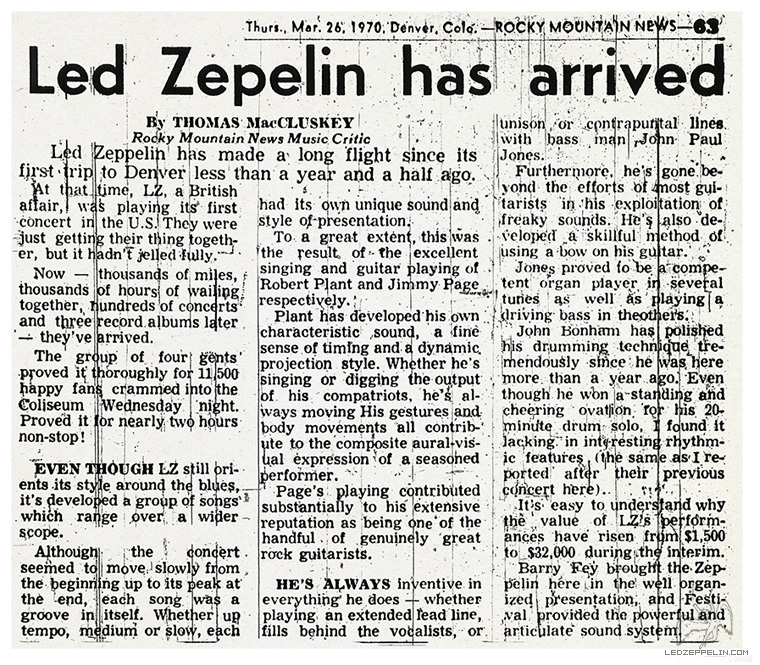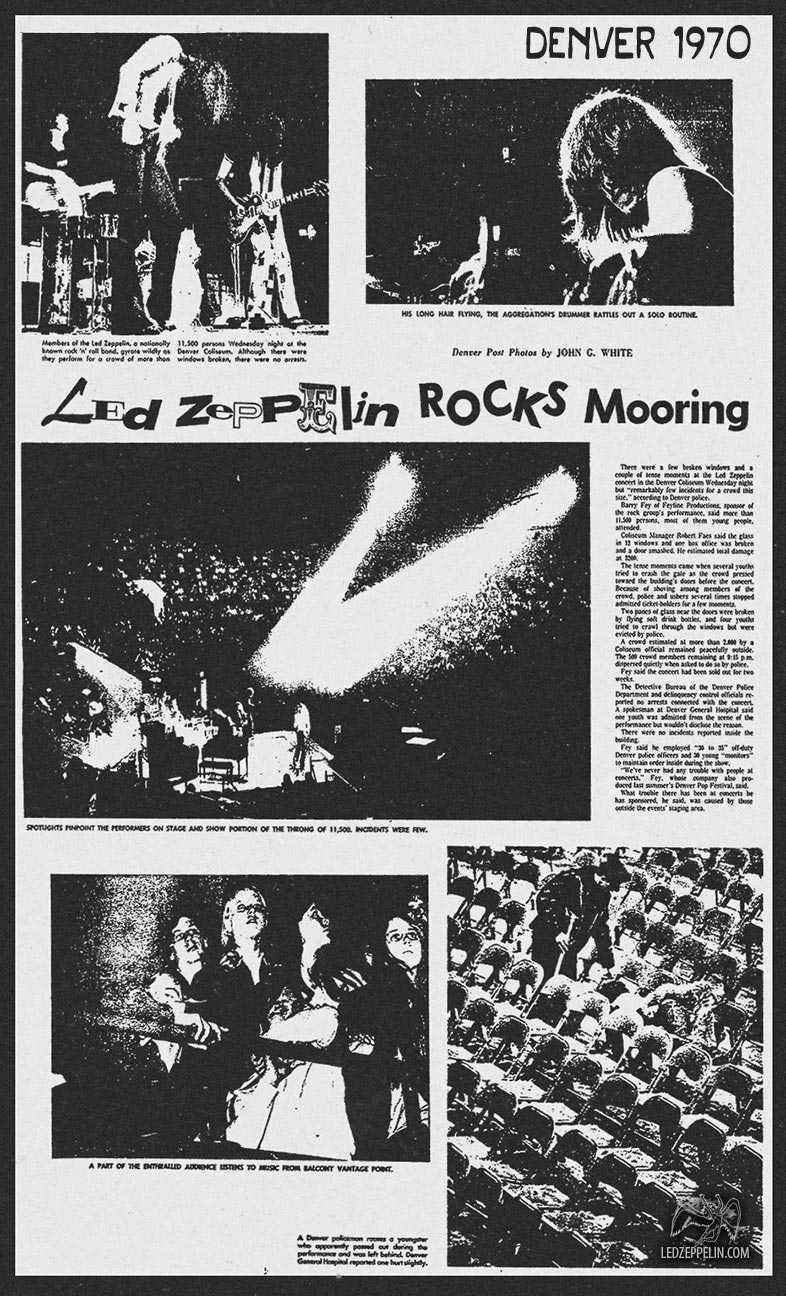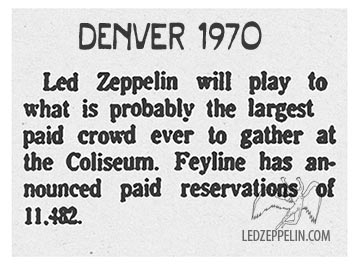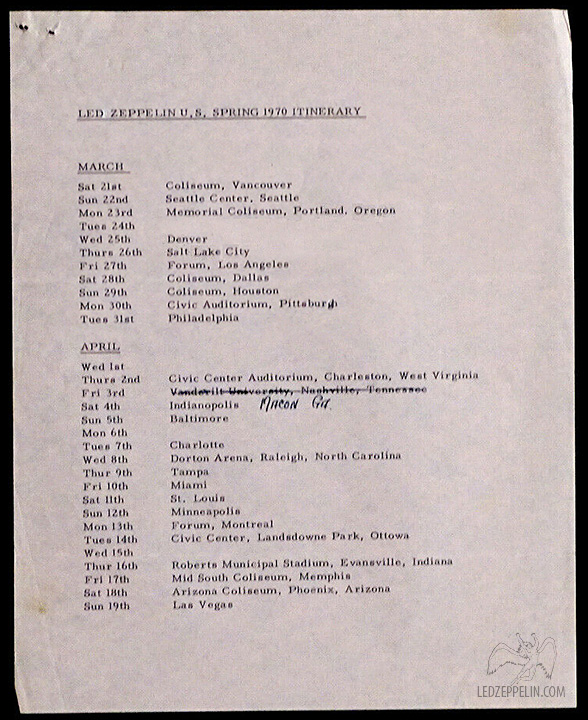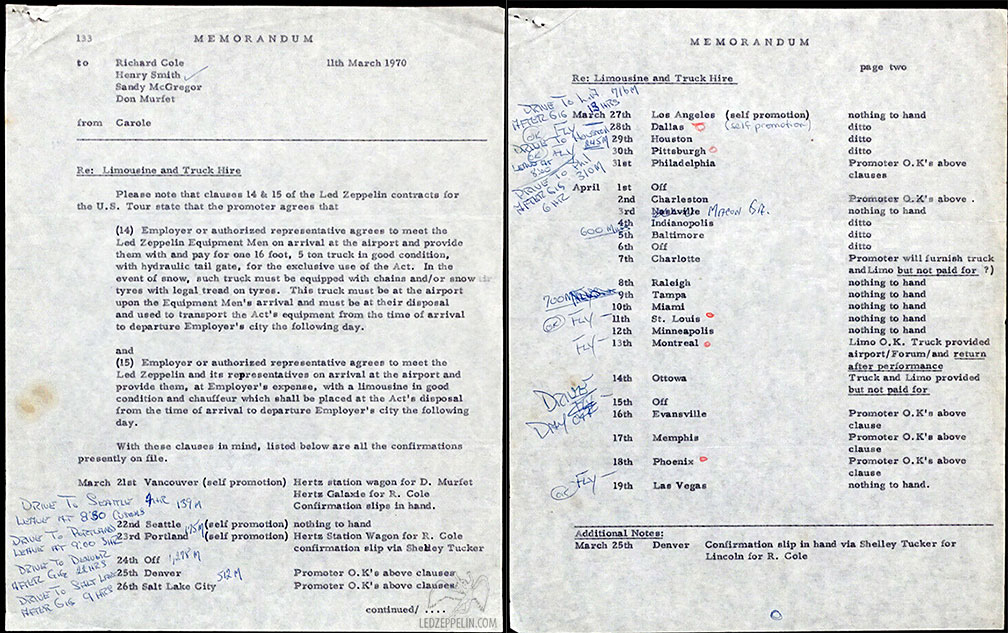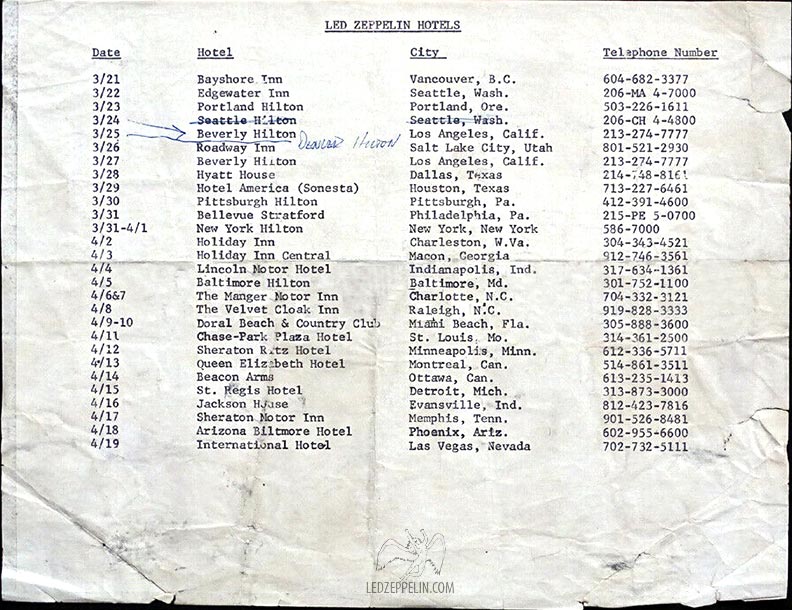includes: We're Gonna Groove, I Can't Quit You Baby, Dazed and Confused, Heartbreaker, Since I've Been Loving You, Organ solo / Thank You, Moby Dick, How Many More Times (medley incl. Boogie Chillen', I Can't Be Satisfied, "Lemon Song"), Whole Lotta Love.
During the show, Plant reflects on their return to Denver: "About eighteen months ago, we played our very first ever gig in the U.S. in this coliseum and so much has happened since then. We'd like to say that we're pleased to be back."
Press Review: 11,500 Overpowered By Rock Heavyweights
Led Zeppelin played to one of the largest crowds ever assembled in the Denver Coliseum as better than 11,500 people turned out to hear England’s heavyweight rock music band Wednesday night.
It was just 18 months ago, as vocalist Robert Plant noted, that Led Zeppelin made its initial US appearance at the coliseum. Its music hasn’t changed significantly in the interim, but its audience has grown considerably.
Led Zeppelin’s lineage runs directly back to the Yardbirds’ brand of rock. It is super heavy, dense with sound, charged with tremendous energy and nearly always well executed. It is also a bit overwhelming at times, and occasionally it offers all the taste of overdone meat.
Part of cookin’ is known when to turn down the flame. But it’s hard to fault the group’s performance. They are great showmen, as are most British musicians, which is why British rock is consistently more exciting than the American version. Rock’s intellectuals have deemed such things passé – everyone’s getting’ back to the roots, ya know – but the showmanship can still turn on an audience.
Led Zeppelin had the crowd soaring almost from the beginning, despite problems with the sound system. The air traffic controller’s slowdown caused a delay in the arrival of the Festival Group’s equipment and the group never had a chance to set it up properly. Plant fought the PA system static throughout the two-hour show, but he was good-humoured about it and enough a professional to overcome the shrieking microphone.
He and guitarist Jimmy Page kept things moving, ripping off seat lines that raced note for note with Page’s lightning fast guitar riffs. Page has really come into his own with Led Zeppelin. Much of his work is cliché, but he plays with such verve, it’s easy to overlook the threadbare material. He does everything well, be it rhythm work, heavy blues, bits of “Bolero”, long bending lines, wah wah pedal riffs, feedback or violin bow guitar. When he gets out front, there are few in his class.
Page covers so much ground, the rhythm section has little to do but provide steady underpinning. John Paul Jones runs off interesting bass patterns, as well as handing occasional keyboard pieces. John Bonham play bass-heavy drums to the obvious delight of the audience, which gave him a standing ovation at the conclusion of his inevitable drum solo.
Rock has many facets these days and Led Zeppelin is among the best in its particular area. They aren’t especially inventive; their lyrics, for instance range from banal sexual innuendos to tired “you cheated, you lied” laments.
But they are skillful enough to overpower friend and foes alike with good, solid rock ‘n’ roll music. Eleven thousand heads bobbing in unison is proof of Led Zeppelin’s worth to the world of electric music. When you turn on a discriminating audience, you know you’re doing something right.
The concert was presented by Feyline Inc. [Denver Post, 3-26-70]
___________________________________
Press Review: Led Zeppelin Has Arrived
Led Zeppelin has made a long flight since its first trip to Denver less than a year and a half ago.
At that time, LZ, a British affair, was playing its first concert in the US. They were just getting their thing together, but it hadn’t fully jelled.
Now – thousands of miles, thousands of hours of wailing together, hundreds of concerts and three record albums later – they’ve arrived.
The group of four gents proved it thoroughly for 11,500 happy fans, crammed into the Coliseum Wednesday night. Proved it for nearly two hours non-stop!
Even though LZ still orients its style around the blues, it’s developed a group of songs which range orver a wider scope.
Although the concert seemed to move slowly from the beginning up to its peak at the end, each song was a groove in itself. Whether up tempo, medium or slow, each had its own unique sound and style of presentation.
To a great extent, this was the result of the excellent singing and guitar playing of Robert Plant and Jimmy Page respectively.
Plant has developed his own characteristic sound, a fine sense of timing and a dynamic projection style. Whether he’s singing or digging the output of his compatriots, he’s always moving. His gestures and body movements all contribute to the composite aural-visual expression of a seasoned performer.
Page’s playing contributed substantially to his extensive reputation as being one of the handful of genuinely great rock guitarists.
He’s always inventive in everything he does – whether playing an extended lead line, fills behind the vocalists, or unison or contrapuntal lines with bass man John Paul Jones.
Furthermore, he’s gone beyond the efforts of most guitarists in his explotation of freaky sounds. He’s also developed a skillful method of using a bow on his guitar.
Jones proved to be a competent organ player in several tunes as well as playing a driving bass in the others.
John Bonham has polished his drumming technique tremendously since he was here more than a year ago. Even though he won a standing ovation for his 20-minute drum solo. I found it lacking in interesting rhythmic features, the same as I reported after their previous concert here.
It’s easy to understand why the value of LZ’s performances have risen from $1,500 to $32,000 during the interm.
Barry Fey brought the Zeppelin here in the well organized presentation and the Festival provided the powerful and articulate sound system. [RockyMountain News, March 26, 1970]
During the show, Plant reflects on their return to Denver: "About eighteen months ago, we played our very first ever gig in the U.S. in this coliseum and so much has happened since then. We'd like to say that we're pleased to be back."
Press Review: 11,500 Overpowered By Rock Heavyweights
Led Zeppelin played to one of the largest crowds ever assembled in the Denver Coliseum as better than 11,500 people turned out to hear England’s heavyweight rock music band Wednesday night.
It was just 18 months ago, as vocalist Robert Plant noted, that Led Zeppelin made its initial US appearance at the coliseum. Its music hasn’t changed significantly in the interim, but its audience has grown considerably.
Led Zeppelin’s lineage runs directly back to the Yardbirds’ brand of rock. It is super heavy, dense with sound, charged with tremendous energy and nearly always well executed. It is also a bit overwhelming at times, and occasionally it offers all the taste of overdone meat.
Part of cookin’ is known when to turn down the flame. But it’s hard to fault the group’s performance. They are great showmen, as are most British musicians, which is why British rock is consistently more exciting than the American version. Rock’s intellectuals have deemed such things passé – everyone’s getting’ back to the roots, ya know – but the showmanship can still turn on an audience.
Led Zeppelin had the crowd soaring almost from the beginning, despite problems with the sound system. The air traffic controller’s slowdown caused a delay in the arrival of the Festival Group’s equipment and the group never had a chance to set it up properly. Plant fought the PA system static throughout the two-hour show, but he was good-humoured about it and enough a professional to overcome the shrieking microphone.
He and guitarist Jimmy Page kept things moving, ripping off seat lines that raced note for note with Page’s lightning fast guitar riffs. Page has really come into his own with Led Zeppelin. Much of his work is cliché, but he plays with such verve, it’s easy to overlook the threadbare material. He does everything well, be it rhythm work, heavy blues, bits of “Bolero”, long bending lines, wah wah pedal riffs, feedback or violin bow guitar. When he gets out front, there are few in his class.
Page covers so much ground, the rhythm section has little to do but provide steady underpinning. John Paul Jones runs off interesting bass patterns, as well as handing occasional keyboard pieces. John Bonham play bass-heavy drums to the obvious delight of the audience, which gave him a standing ovation at the conclusion of his inevitable drum solo.
Rock has many facets these days and Led Zeppelin is among the best in its particular area. They aren’t especially inventive; their lyrics, for instance range from banal sexual innuendos to tired “you cheated, you lied” laments.
But they are skillful enough to overpower friend and foes alike with good, solid rock ‘n’ roll music. Eleven thousand heads bobbing in unison is proof of Led Zeppelin’s worth to the world of electric music. When you turn on a discriminating audience, you know you’re doing something right.
The concert was presented by Feyline Inc. [Denver Post, 3-26-70]
___________________________________
Press Review: Led Zeppelin Has Arrived
Led Zeppelin has made a long flight since its first trip to Denver less than a year and a half ago.
At that time, LZ, a British affair, was playing its first concert in the US. They were just getting their thing together, but it hadn’t fully jelled.
Now – thousands of miles, thousands of hours of wailing together, hundreds of concerts and three record albums later – they’ve arrived.
The group of four gents proved it thoroughly for 11,500 happy fans, crammed into the Coliseum Wednesday night. Proved it for nearly two hours non-stop!
Even though LZ still orients its style around the blues, it’s developed a group of songs which range orver a wider scope.
Although the concert seemed to move slowly from the beginning up to its peak at the end, each song was a groove in itself. Whether up tempo, medium or slow, each had its own unique sound and style of presentation.
To a great extent, this was the result of the excellent singing and guitar playing of Robert Plant and Jimmy Page respectively.
Plant has developed his own characteristic sound, a fine sense of timing and a dynamic projection style. Whether he’s singing or digging the output of his compatriots, he’s always moving. His gestures and body movements all contribute to the composite aural-visual expression of a seasoned performer.
Page’s playing contributed substantially to his extensive reputation as being one of the handful of genuinely great rock guitarists.
He’s always inventive in everything he does – whether playing an extended lead line, fills behind the vocalists, or unison or contrapuntal lines with bass man John Paul Jones.
Furthermore, he’s gone beyond the efforts of most guitarists in his explotation of freaky sounds. He’s also developed a skillful method of using a bow on his guitar.
Jones proved to be a competent organ player in several tunes as well as playing a driving bass in the others.
John Bonham has polished his drumming technique tremendously since he was here more than a year ago. Even though he won a standing ovation for his 20-minute drum solo. I found it lacking in interesting rhythmic features, the same as I reported after their previous concert here.
It’s easy to understand why the value of LZ’s performances have risen from $1,500 to $32,000 during the interm.
Barry Fey brought the Zeppelin here in the well organized presentation and the Festival provided the powerful and articulate sound system. [RockyMountain News, March 26, 1970]
includes: We're Gonna Groove, I Can't Quit You Baby, Dazed and Confused, Heartbreaker, Since I've Been Loving You, Organ solo / Thank You, Moby Dick, How Many More Times (medley incl. Boogie Chillen', I Can't Be Satisfied, "Lemon Song"), Whole Lotta Love.
